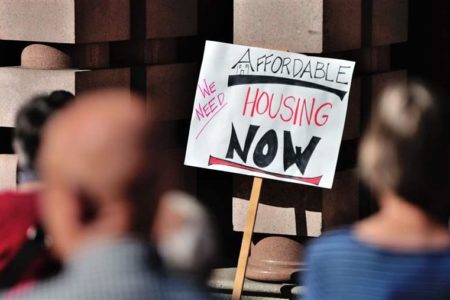The coronavirus pandemic has had an overwhelming impact on many, and now the COVID-19 crisis also stands to exacerbate the nation’s sizable affordable housing shortage.
With more people losing jobs and suffering other hardships—especially those in communities of color—the question of housing will play a larger role in the overall impacts of the coronavirus pandemic. This is more of a fundamental issue than some might think, according to Roger K. Lewis, a professor emeritus of architecture at the University of Maryland,
“Most of us think about roads, bridges, transit systems, and public utilities, along with education and health care,” Lewis, writes in a recent Op-Ed in the Washington Post. “But affordable housing is an essential component of infrastructure; an investment needs especially evident as the coronavirus infects so many of our country’s most vulnerable people.”
Many healthcare officials and social justice advocates are calling on legislators to consider housing as a necessity, according to social justice nonprofit, Well Being Trust.
“Access to shelter is a human right,” the group writes in a recent blog post. “With social distancing guidelines and stay-at-home orders in place for many communities across the country, access to safe, stable, and affordable housing is more important than ever. As we look for ways to limit the spread of the virus and reduce risks to public health, improving access to housing needs to be part of that solution.”
Affordable Housing and Preventing the Spread

Infrastructure investment is a policy for combating weakening economic conditions spawned by the pandemic.
Experts say rising unemployment could trigger a 45% rise in homelessness by the end of 2020. This could be aggravated by increasing the economic impacts of the pandemic.
Worse, the market isn’t easing anyone’s burden.
“Housing prices have skyrocketed in many cities in the country,” Isabel Solange Muñoz, an Assistant Professor of Geography, University of Tennessee, writes in a recent article for The Conversation. “In some of the most expensive cities in the U.S., like New York and Washington, D.C., this has meant that median sales prices have increased over 50% from 2009 to 2019. Rent prices have also continued to rise, increasing 150% since 2010. In the most affluent cities, the median rent price for a one-bedroom apartment is greater than $2,000.”
According to the National Housing Conference, “the problem is most significant in New York (19.0% Latino), New Jersey (20% Latino), and California (38.9% Latino). In those three states, 22% of households are paying more than 50% of pre-tax income for housing, while median home values and rents in these states are among the highest in the country. Many cities also suffer high rates of housing poverty not because they are so expensive but because their economies are bad.”
During this pandemic, millions are homeless, and their lives are falling apart. They struggle to stay healthy, to hold jobs, to reserve personal relationships, to maintain a sense of hope.
Strategies for increasing affordable housing amid the COVID-19

Local governments and nonprofit service providers are scrambling to put in place temporary measures to help those who lack stable housing
These measures include purchasing motels to shelter unhoused families, placing hand-washing stations in homeless encampments, and providing emergency rental assistance.
“Even before COVID-19 came to this country, we had a shortage of seven million homes affordable and available to the lowest income people,” Diane Yentel, president and CEO of the National Low Income Housing Coalition, said on a recent web panel hosted by the Urban Land Institute.
Many policymakers are requesting to expand and strengthen policies that will improve access to affordable housing.
The policymakers must make more serious efforts to reduce the number of households who lack affordable, stable, decent-quality housing, and focus on three goals during this deadly pandemic.
- Shield existing affordable rental housing from physical deterioration and financial insecurity.
- Intensify the amount of long-term affordable rental housing, especially in pandemic hotspots.
- Backing affordable housing projects currently in the pipeline that face financial obstacles due to the pandemic.
Why affordable housing important for Latinos during a pandemic?

Minority groups face a higher risk of infection and the many burdens associated. Hence, COVID-19 has been disproportionately affected is worsening already harsh historical inequities.
Lack of affordable housing has substantial implications for many Latinos and dramatically impacts their quality of life.
Latinos and low-income families who face difficulties paying their rent or mortgage or their utility bills are less likely to have a usual source of medical care and are more likely to postpone needing treatment than those who have more affordable housing.
This making Latinos more vulnerable to the pandemic. Therefore, the coronavirus outbreak makes it harder for Latinos and other minorities.
Check out these 19 solutions to immediately ease the coronavirus pandemic and its impact on Latinos and people of color, as well as make long-term strides to address underlying inequities that are aggravated during this time.
Learn more about the coronavirus pandemic and Latino health:
The post Why Affordable Housing is Important During Pandemic? appeared first on Salud America.
Recommend0 recommendationsPublished in Fit Fiesta Force, Fuerza por la Salud
